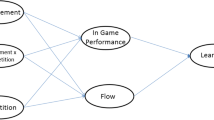Abstract
The primary aim of the study was to examine whether performance on a science assessment in an immersive virtual environment was associated with changes in scientific inquiry self-efficacy. A secondary aim of the study was to examine whether performance on the science assessment was equitable for students with different levels of computer game self-efficacy, including whether gender differences were observed. We examined 407 middle school students’ scientific inquiry self-efficacy and computer game self-efficacy before and after completing a computer game-like assessment about a science mystery. Results from path analyses indicated that prior scientific inquiry self-efficacy predicted achievement on end-of-module questions, which in turn predicted change in scientific inquiry self-efficacy. By contrast, computer game self-efficacy was neither predictive of nor predicted by performance on the science assessment. While boys had higher computer game self-efficacy compared to girls, multi-group analyses suggested only minor gender differences in how efficacy beliefs related to performance. Implications for assessments with virtual environments and future design and research are discussed.



Similar content being viewed by others
References
Bandura A (1977) Self-efficacy: towards a unifying theory of behavioural change. Psychol Rev 84:191–215
Bandura A (1986) Social foundations of thought and action: a social cognitive theory. Prentice Hall, Englewood Cliffs
Bandura A (1997) Self-efficacy: the exercise of control. Freeman, New York
Bandura A, Barbaranelli C, Caprara GV, Pastorelli C (2001) Self-efficacy beliefs as shapers of children’s aspirations and career trajectories. Child Dev 72(1):187–206. doi:10.1111/1467-8624.00273
Bickel R (2007) Multilevel analysis for applied research: it’s just regression!. Guilford Press, New York
Britner SL, Pajares F (2001) Self-efficacy beliefs, motivation, race, and gender in middle school science. J Women Minor Sci Eng 7:271–285
Britner SL, Pajares F (2006) Sources of science self-efficacy beliefs of middle school students. J Res Sci Teach 43(5):485–499. doi:10.1002/tea.20131
Buchman DD, Funk JB (1996) Video and computer games in the ’90 s: children’s time commitment and game preference. Child Today 24:12–15
Bussey K, Bandura A (1999) Social cognitive theory of gender development and differentiation. Psychol Rev 106(4):676
Chen JA, Usher EL (2013) Profiles of the sources of science self-efficacy. Learn Individ Differ 24:11–21. doi:10.1016/j.lindif.2012.11.002
Chen JA, Metcalf SJ, Tutwiler MS (2014) Motivation and beliefs about the nature of scientific knowledge within an immersive virtual ecosystems environment. Contemp Educ Psychol 39:112–123
Clark DB, Nelson B, Sengupta P, D’Angelo CM (2009) Rethinking science learning through digital games and simulations: genres, examples, and evidence. Invited topic paper in the proceedings of the national academies board on science education workshop on learning science: computer games, simulations, and education, Washington
Clarke-Midura J, Dede C (2010) Assessment, technology, and change. J Res Technol Educ 42(3):309–328
Eccles JS, Adler T, Futterman R, Goff SB, Kaczala C, Meece JL et al (1983) Expectations, values, and academic behaviors. In: Spence JT (ed) Achievement and achievement motivation. Freeman, San Francisco, pp 75–146
Habgood MPJ, Ainsworth SE (2011) Motivating children to learn effectively: exploring the value of intrinsic integration in educational games. J Learn Sci 20(2):169–206. doi:10.1080/10508406.2010.508029
Hartmann T, Klimmt C (2006) Gender and computer games: exploring females’ dislikes. J Comput Med Commun 11(4):910–931
Hill C, Corbett C, St. Rose A (2010) Why so few? Women in science, technology, engineering, and mathematics. American Association of University Women, Washington, DC
Johnson RD, Hornik S, Salas E (2008) An empirical examination of factors contributing to the creation of successful e-learning environments. Int J Hum Comput Stud 66(5):356–369
Ketelhut DJ (2007) The impact of student self-efficacy on scientific inquiry skills: an exploratory investigation in River City, a multi-user virtual environment. J Sci Educ Technol 16(1):99–111
Ketelhut DJ (2010) Assessing gaming, computer and scientific inquiry self-efficacy in a virtual environment. In: Annetta LA, Bronack S (eds) Serious educational game assessment: practical methods and models for educational games, simulations and virtual worlds. Sense Publishers, Amsterdam, pp 1–18
Ketelhut DJ, Nelson B, Schifter C, Kim Y (2013) Improving science assessments by situating them in a virtual environment. Educ Sci 3(2):172–192
Kıran D, Sungur S (2012) Middle school students’ science self-efficacy and its sources: examination of gender difference. J Sci Educ Technol 21(5):619–630. doi:10.1007/s10956-011-9351-y
Klimt C, Hartmann T (2006) Effectance, self-efficacy, and the motivation to play video games. In: Vorderer P, Bryant J (eds) Playing video games: motives, responses, and consequences. Lawrence Erlbaum, Hillsdale, pp 153–168
Kline RB (2010) Principles and practice of structural equation modeling, 3rd edn. Guilford Press, New York
Lapan RT, Shaughnessy P, Boggs K (1996) Efficacy expectations and vocational interests as mediators between sex and choice of math/science college majors: a longitudinal study. J Vocat Behav 49(3):277–291
Lepper MR, Malone TW (1987) Intrinsic motivation and instructional effectiveness in computer-based education. In: Snow RE, Farr MJ (eds) Aptitude, learning and instruction: III. Conative and affective process analyses. Erlbaum, Hillsdale, pp 255–286
Lucas K, Sherry JL (2004) Sex differences in video game play: a communication-based explanation. Commun Res 31(5):499–523. doi:10.1177/0093650204267930
Meluso A, Zheng M, Spires HA, Lester J (2012) Enhancing 5th graders’ science content knowledge and self-efficacy through game-based learning. Comput Educ 59(2):497–504
Mikropoulos TA, Natsis A (2011) Educational virtual environments: a ten-year review of empirical research (1999–2009). Comput Educ 56(3):769–780. doi:10.1016/j.compedu.2010.10.020
Multon K, Brown S, Lent R (1991) Relation of self-efficacy beliefs to academic outcomes: a meta-analytic investigation. J couns psychol 38(1):30–38
Muthén LK, Muthén BO (2012) Statistical analysis with latent variables. Mplus user’s guide: 7th edition (Version 7.0), Los Angeles
National Research Council (2005) America’s lab report: investigations in high school science. National Academies Press, Washington
Nelson BC, Erlandson BE (2012) Design for learning in virtual worlds. Interdisciplinary approaches to educational technology. Routledge, New York
Nelson BC, Ketelhut DJ (2008) Exploring embedded guidance and self-efficacy in educational multi-user virtual environments. Int J Comput Support Collab Learn 3(4):413–427
Nietfeld JL, Shores LR, Hoffmann KF (2014) Self-regulation and gender within a game-based learning environment. J Educ Psychol 106(4):961–973. doi:10.1037/a0037116
O’Reilly T, McNamara DS (2007) The impact of science knowledge, reading skill, and reading strategy knowledge on more traditional “high-stakes” measures of high school students’ science achievement. Am Educ Res J 44(1):161–196. doi:10.3102/0002831206298171
Orvis KA, Horn DB, Belanich J (2008) The roles of task difficulty and prior videogame experience on performance and motivation in instructional videogames. Comput Hum Behav 24(5):2415–2433
Pajares F (1996) Self-efficacy beliefs in academic settings. Rev Educ Res 66:543–578
Pajares F (2002) Gender and perceived self-efficacy in self-regulated learning. Theory Pract 41(2):116–125
Pavlas D, Heyne K, Bedwell W, Lazzara E, Salas E (2010) Game-based learning: the impact of flow state and videogame self-efficacy. In: Proceedings of the human factors and ergonomics society annual meeting Vol. 54, No. 28, SAGE Publications, Beverley Hills, 2398–2402
Schunk DH (1983) Ability versus effort attributional feedback: differential effects on self-efficacy and achievement. J Educ Psychol 75:848–856
Schunk DH, Meece JL (2005) Self-efficacy development in adolescence. In: Pajares F, Urdan T (eds) Self-efficacy beliefs of adolescents. Information Age, Charlotte, pp 71–96
Stajovic AD, Luthans F (1998) Self-efficacy and work-related performance: a meta analysis. Psychol Bull 124:240–261
Tai R, Liu C, Maltese A, Fan X (2006) Career choice: enhanced: planning early for careers in science. Science 312(5777):1143–1144
Terlecki M, Brown J, Harner-Steciw L, Irvin-Hannum J, Marchetto-Ryan N, Ruhl L, Wiggins J (2011) Sex differences and similarities in video game experience, preferences, and self-efficacy: implications for the gaming industry. Curr Psychol 30(1):22–33
Timms M, Clements D, Gobert J, Ketelhut DJ, Lester J, Reese D, Wiebe E (2012) New measurement paradigms. Report by the new measurement paradigms group prepared for the community for advancing discovery research in education. Retrieved from http://cadrek12.org/sites/default/files/NMP%20Report%20041412_0.pdf
Turkle S (1995) Life on the screen: identity in the age of the internet. Simon and Schuster, New York
Usher EL, Pajares F (2008) Sources of self-efficacy in school: critical review of the literature and future directions. Rev Educ Res 78(4):751–796. doi:10.3102/0034654308321456
Wang MNM, Wu KC, Iris Huang TC (2007) A study on the factors affecting biological concept learning of junior high school students. Int J Sci Educ 29(4):453–464
Weiner B (2005) Motivation from an attribution perspective and the social psychology of perceived competence. In: Elliot AJ, Dweck CS (eds) Handbook of Competence and Motivation. Guilford Press, New York, pp 73–84
Wigfield A, Eccles JS (2002) The development of competence beliefs, expectancies for success, and achievement values from childhood through adolescence. In: Wigfield A, Eccles JS (eds) Development of achievement motivation. Academic Press, San Diego, pp 91–120
Woodruff SL, Cashman JF (1993) Task, domain, and general efficacy: a reexamination of the self-efficacy scale. Psychol Rep 72:423–432
Wouters P, van Nimwegen C, van Oostendorp H, van der Spek ED (2013) A meta-analysis of the cognitive and motivational effects of serious games. J Educ Psychol 105(2):249
Wright JC, Huston AC, Vandewater EA, Bickham DS, Scantlin RM, Kotler JA, Finkelstein J (2001) American children’s use of electronic media in 1997: a national survey. J Appl Dev Psychol 22(1):31–47. doi:10.1016/S0193-3973(00)00064-2
Zimmerman BJ (2000) Self-Efficacy: an essential motive to learn. Contemp Educ Psychol 25(1):82–91. doi:10.1006/ceps.1999.1016
Acknowledgments
We acknowledge the contributions of Brian Nelson, Catherine Schifter, Martha Caray, Mandy Kirchgessner, Chris Teufel, Angela Shelton, and other SAVE Science team members for their contributions to the larger project of which this study is a part. We also are grateful to Jennifer Cromley and anonymous reviewers for their helpful feedback on previous versions of this manuscript. This material is based upon work supported by the National Science Foundation under Grant No. 0822308.
Conflict of interest
The authors declare that they have no conflicts of interest.
Author information
Authors and Affiliations
Corresponding author
Rights and permissions
About this article
Cite this article
Bergey, B.W., Ketelhut, D.J., Liang, S. et al. Scientific Inquiry Self-Efficacy and Computer Game Self-Efficacy as Predictors and Outcomes of Middle School Boys’ and Girls’ Performance in a Science Assessment in a Virtual Environment. J Sci Educ Technol 24, 696–708 (2015). https://doi.org/10.1007/s10956-015-9558-4
Published:
Issue Date:
DOI: https://doi.org/10.1007/s10956-015-9558-4




